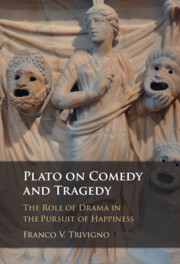Book contents
- Plato on Comedy and Tragedy
- Plato on Comedy and Tragedy
- Copyright page
- Dedication
- Contents
- Acknowledgments
- Introduction
- Chapter 1 Plato’s Definition of Comedy
- Chapter 2 Comedic Characterization in the Euthydemus
- Chapter 3 Parody in the Cratylus
- Chapter 4 Plato’s Definition of Tragedy
- Chapter 5 Tragedy and the Best Life in the Gorgias
- Chapter 6 Tragedy and Death in the Phaedo
- Chapter 7 The Unity of Comedy and Tragedy in the Symposium
- Bibliography
- General Index
- Index Locorum
Chapter 7 - The Unity of Comedy and Tragedy in the Symposium
Published online by Cambridge University Press: 24 October 2025
- Plato on Comedy and Tragedy
- Plato on Comedy and Tragedy
- Copyright page
- Dedication
- Contents
- Acknowledgments
- Introduction
- Chapter 1 Plato’s Definition of Comedy
- Chapter 2 Comedic Characterization in the Euthydemus
- Chapter 3 Parody in the Cratylus
- Chapter 4 Plato’s Definition of Tragedy
- Chapter 5 Tragedy and the Best Life in the Gorgias
- Chapter 6 Tragedy and Death in the Phaedo
- Chapter 7 The Unity of Comedy and Tragedy in the Symposium
- Bibliography
- General Index
- Index Locorum
Summary
In this chapter, I provide an interpretation of the famous claim at the end of the Symposium that “the same man” ought to be able to write both comedy and tragedy, and a speculative reconstruction of the arguments that Socrates might have used to secure that claim in his discussion with Agathon and Aristophanes. I argue that ideal comedy and tragedy are unified in at least three ways. First, they constitute a teleological unity, in that their ethical imitations both aim at moral improvement; second, they constitute an ethical unity, in that they both rely on, and endorse, a single theory of value, according to which wisdom and virtue are good and ignorance and vice are bad; and third, they constitute an epistemic unity, in that the objects that they imitate – ridiculousness and seriousness in agents and actions – form opposite parts of the same branch of knowledge, such that one cannot know one without knowing the other. I further argue that actual comedy and tragedy are unified but in a much weaker sense that does not involve any knowledge. In the end, I discuss the possibility of tragicomedy and consider in what sense it might be correct to understand Plato’s dialogues as tragicomedies.
Information
- Type
- Chapter
- Information
- Plato on Comedy and TragedyThe Role of Drama in the Pursuit of Happiness, pp. 220 - 247Publisher: Cambridge University PressPrint publication year: 2025
